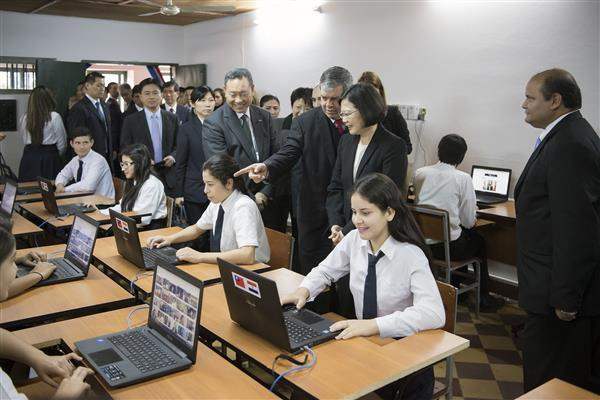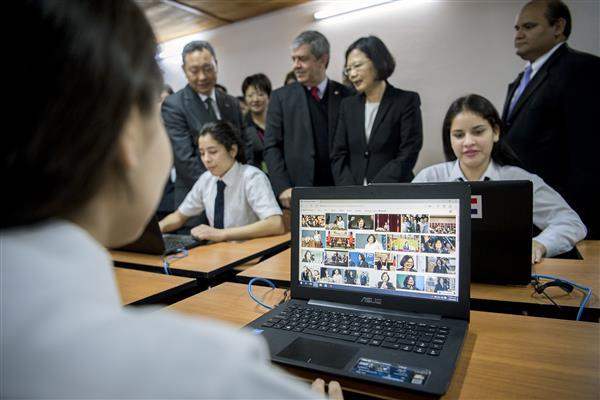News & activities
 News releases
News releases
At 11:00 a.m. on June 29 Paraguay time (11:00 p.m. Taipei time), President Tsai Ing-wen attended a ceremony at the General Andrés Rodriguez School for the donation of computers by Taiwan's ASUS Foundation.
As President Tsai arrived, teachers and students lined up on either side of the school's entrance and waved the national flags of the two countries in an enthusiastic welcome. Paraguay Minister of Education and Culture Enrique Riera Escudero and Principal Alberto Vila of the General Andrés Rodriguez School (recipient of the donated computers) led the president into the venue for the signing ceremony. After the playing of the two countries' national anthems, the president stood witness as the donation agreement was signed in turn by Hsieh Hsiao-min (謝孝民), ASUSTeK's regional manager for South America, ROC Ambassador to Paraguay Alexander Tah-Ray Yui (俞大㵢), and Minister of Education and Culture Riera, testifying to Taiwan's support for Paraguay's digital education.
In remarks, President Tsai first thanked ASUSTeK Computer Inc. for generously donating 400 notebook and tablet computers to schools at all levels in Paraguay, and expressed hope that this donation will help bridge the digital divide. The president stated that personal computers, tablets, mobile phones, and digital content from Taiwan are popular throughout the world.
The president also mentioned that the ASUS Foundation in recent years has donated more than 4,000 notebook and tablet computers worldwide, with over half of these donations going to countries in Central and South America. ASUSTeK Computer Inc. is doing this not just for the sake of its corporate image or the image of Taiwan; more importantly, it hopes to bolster the availability of learning resources in the local areas where such donations are made.
President Tsai said she was very gratified to see that a Taiwanese company that markets its products worldwide has not forgotten that it should give back to local societies wherever it can, and has remained true to its original conviction that all persons—no matter where they're from or what their background may be—ought to enjoy equal access to digital resources. There are currently a lot of remote areas in Taiwan that also suffer from a shortage of learning resources, but computers and the Internet open up a whole new window on the world for students from such areas. Making connections via the cloud eliminates geographic barriers and turns the whole world into one's personal library. For this reason, Taiwan can identify with people who are affected by the digital divide. We are keenly aware that universal availability of information and communication technology (ICT) resources will improve education, job opportunities, and the quality of medical care, and provide opportunities for people to take part in the process of globalization.
The president stated that she has long advocated that access to broadband should be regarded as a human right, with key factors like whether access is sufficiently universal, and whether everyone in any given country has basic ICT literacy. This has a bearing on more than just job market competitiveness; it is also an indicator of social equality. Taiwan is a world leader in the manufacture of ICT devices as well as digital innovation, said the president, who added: "We are willing to contribute what we can to the world, and to our friends."
The president also mentioned that Taiwan has already established 101 Digital Opportunity Centers in 10 different APEC member countries as part of an ongoing APEC initiative to help workers and underprivileged communities in those countries to raise their ICT capacities. Paraguay is one of Taiwan's most important diplomatic allies, and Taiwan is more than willing to help Paraguay promote this development program, which is already quite mature. In the future, Taiwan and Paraguay will conduct joint research to further deepen and expand this project.
And finally, President Tsai toured the school's computer education center to understand the state of information education in Paraguay.










